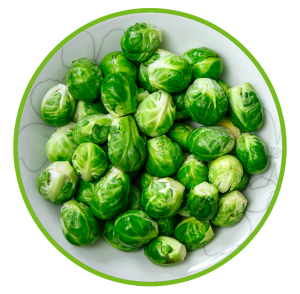Cabbage and Brussels Sprouts

RECOMMENDATION
To incorporate cabbage into your meals, it can be used in salads, stews, soups, slaws, and even as the main ingredient in sauerkraut and kimchi.
To enjoy, brussels sprouts can be roasted, pureed in soups, used whole in casseroles, or thinly sliced and pan-fried. Even children can find them delicious when prepared well.
If you are consuming non-organic cabbage or brussels sprouts, it’s advisable to remove a couple of external leaves to minimise potential pesticide ingestion. It is recommended to include brussels sprouts in your diet frequently to benefit from their potential anti-cancer health benefits.
Why Cabbage and Brussels Sprouts are good for us
CONSUME OFTEN
Cabbage, both red and green varieties, and brussels sprouts, underrated vegetables that can be used in various hot and cold dishes. They contain Glucosinolates, which can be converted into isothiocyanate compounds known for their potential to prevent different types of cancers, including bladder, breast, colon, and prostate cancer.
Red cabbage has significantly higher levels of vitamin A in the form of carotenoids like beta-carotene, lutein, and zeaxanthin compared to green cabbage. On the other hand, green cabbage is a better source of vitamin K, but both varieties are good sources of this vitamin. Both red and green cabbages are also rich in vitamin C, a potent antioxidant that may provide protection against heart disease, certain cancers, and vision loss.
